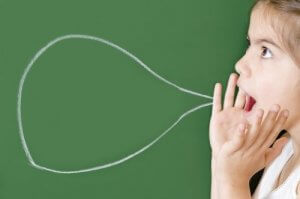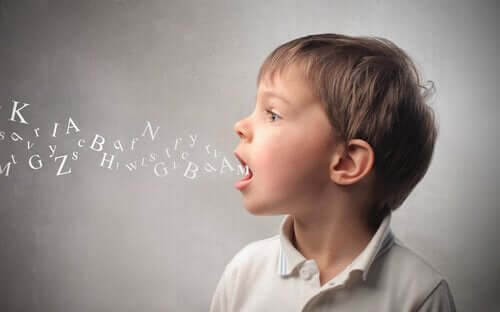Phonological Awareness in Children


Written and verified by the philologist Elena Castro
Have you ever asked why we speak in a certain way? Or how children learn to say sounds that, little by little, turn into words? This all has to do with phonological awareness in children, and we develop this awareness at a young age without even realizing it.
What is phonological awareness in children?
The concept
Phonological awareness is the basis of any type of oral communication. Without sounds, we can’t verbalize words, much less ideas.
Despite the fact that we begin to develop this part of language when we’re babies, it changes and matures over the course of our entire lives. Some examples may be the perfectioning of diction or the learning of new languages along with their particular sounds.
Phonology during infancy
Let’s start at the beginning: How do you talk to a baby? Without a doubt, you don’t use the same tone or the same complexity that you do when talking to older children or adults.
Thanks to this phenomenon, known as baby talk, we learn the sounds and words that make up our language in an intuitive way.

Imitation and repetition are essential during this stage. Pronunciation is a complex process that requires the action of many parts of the throat and mouth, meaning it’s not an easy task to master.
For example, when you say something simple like “momma” to babies, they try to imitate you over and over until they discover the right position for pronouncing the m. And each time they learn a new sound, they repeat it over and over.
The effects of phonological awareness in children
Phonological awareness is defined as the ability that gives us access to the structure of oral language and the awareness of the phonological segments of words. This ability is necessary for the learning of written language. Therefore, learning to speak correctly during childhood is of vital importance.
In schools, children first begin learning through oral exercises. Then, teachers go on to teach them the corresponding sounds and letters.
Remember that mirror writing is normal during early ages. Complexity increases as children grow, and they learn to write the words and phrases that they say.
Little by little, children learn that not everything they say or write is correct, but rather, there are rules that dictate our language. This is the point when some teachers or parents realize that some children may have a certain degree of dyslexia. However, today dyslexia isn’t an impediment.
Maximizing phonological awareness in children
Imitation and repetition
As we’ve said, this is the most common method that babies and children use. But, who says it’s not useful for teens and adults as well? It’s true that, the older we get, the longer we take to adapt to new phonological rules. However, it’s by no means impossible.
We can perfect our pronunciation in our own language or other languages at any age… We just need a good example to follow.
Try to repeat words with similar sounds, as in tongue twisters, or imitate the accent or pronunciation of others. The more children exercise this ability, the easier it will be for them to adapt.

Read
We can help our children reach their full phonological potential through two forms of reading. Theses are reading out loud or listening to reading and imitating it later. Furthermore, if you’re reading a story with multiple characters, you can read together.
Any type of reading is beneficial. Instilling this habit in children isn’t only beneficial when it comes to writing and speaking. It also helps broaden their vocabulary, creativity and imagination. At the same time, it helps them learn to speak in public.
Experts in diction
There are times when children experience difficulties pronouncing some specific sounds. In these cases, a speech or language therapist may be the best option for correcting and practicing the correct form of pronunciation.
Furthermore, a speech therapist as well as some teachers can suggest certain exercises that you can use to help your child at home. No one is perfect, but we all have the ability to improve.
Have you ever asked why we speak in a certain way? Or how children learn to say sounds that, little by little, turn into words? This all has to do with phonological awareness in children, and we develop this awareness at a young age without even realizing it.
What is phonological awareness in children?
The concept
Phonological awareness is the basis of any type of oral communication. Without sounds, we can’t verbalize words, much less ideas.
Despite the fact that we begin to develop this part of language when we’re babies, it changes and matures over the course of our entire lives. Some examples may be the perfectioning of diction or the learning of new languages along with their particular sounds.
Phonology during infancy
Let’s start at the beginning: How do you talk to a baby? Without a doubt, you don’t use the same tone or the same complexity that you do when talking to older children or adults.
Thanks to this phenomenon, known as baby talk, we learn the sounds and words that make up our language in an intuitive way.

Imitation and repetition are essential during this stage. Pronunciation is a complex process that requires the action of many parts of the throat and mouth, meaning it’s not an easy task to master.
For example, when you say something simple like “momma” to babies, they try to imitate you over and over until they discover the right position for pronouncing the m. And each time they learn a new sound, they repeat it over and over.
The effects of phonological awareness in children
Phonological awareness is defined as the ability that gives us access to the structure of oral language and the awareness of the phonological segments of words. This ability is necessary for the learning of written language. Therefore, learning to speak correctly during childhood is of vital importance.
In schools, children first begin learning through oral exercises. Then, teachers go on to teach them the corresponding sounds and letters.
Remember that mirror writing is normal during early ages. Complexity increases as children grow, and they learn to write the words and phrases that they say.
Little by little, children learn that not everything they say or write is correct, but rather, there are rules that dictate our language. This is the point when some teachers or parents realize that some children may have a certain degree of dyslexia. However, today dyslexia isn’t an impediment.
Maximizing phonological awareness in children
Imitation and repetition
As we’ve said, this is the most common method that babies and children use. But, who says it’s not useful for teens and adults as well? It’s true that, the older we get, the longer we take to adapt to new phonological rules. However, it’s by no means impossible.
We can perfect our pronunciation in our own language or other languages at any age… We just need a good example to follow.
Try to repeat words with similar sounds, as in tongue twisters, or imitate the accent or pronunciation of others. The more children exercise this ability, the easier it will be for them to adapt.

Read
We can help our children reach their full phonological potential through two forms of reading. Theses are reading out loud or listening to reading and imitating it later. Furthermore, if you’re reading a story with multiple characters, you can read together.
Any type of reading is beneficial. Instilling this habit in children isn’t only beneficial when it comes to writing and speaking. It also helps broaden their vocabulary, creativity and imagination. At the same time, it helps them learn to speak in public.
Experts in diction
There are times when children experience difficulties pronouncing some specific sounds. In these cases, a speech or language therapist may be the best option for correcting and practicing the correct form of pronunciation.
Furthermore, a speech therapist as well as some teachers can suggest certain exercises that you can use to help your child at home. No one is perfect, but we all have the ability to improve.
All cited sources were thoroughly reviewed by our team to ensure their quality, reliability, currency, and validity. The bibliography of this article was considered reliable and of academic or scientific accuracy.
- Calvillo, L. J., José, M., & Mosquera, R. (2017). El Entrenamiento De La Conciencia Fonológica. Retrieved from http://openaccess.uoc.edu/webapps/o2/bitstream/10609/61425/6/ljimenezcalTFM0117memoria.pdf
- Gutierréz, R., & Díez, A. (2018). Conciencia fonológica y desarrollo evolutivo de la escritura en las primeras edades. Educacion XX1, 21(1), 395–416. https://doi.org/10.5944/educXX1.13256
This text is provided for informational purposes only and does not replace consultation with a professional. If in doubt, consult your specialist.








